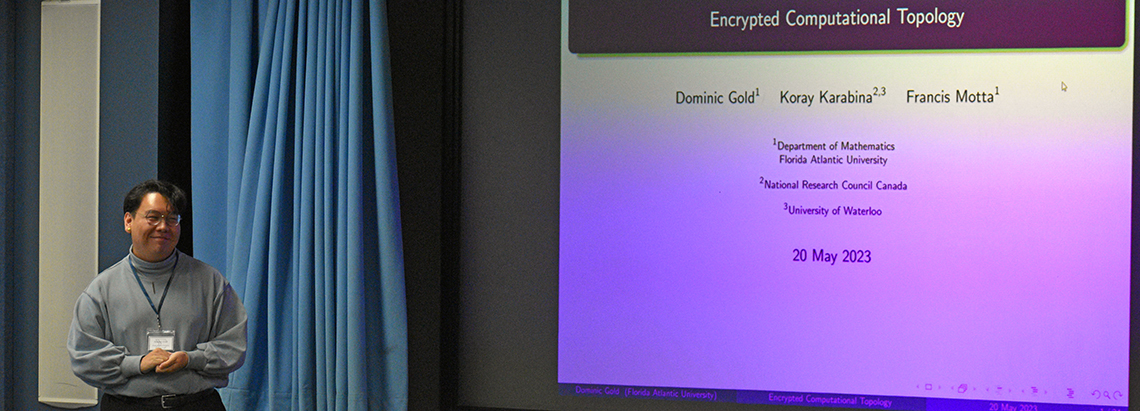
Name: Dominic Gold
Degree program: Ph.D. in Mathematics
Research area of interest: Data Science, Analytics, and Cryptography
Describe one of the highlights of your career as a Ph.D. candidate at FAU:
A highlight of my time as a graduate student has been presenting my research at seminars and conferences related to data science and cryptography. Talks and conferences are important for graduate students to attend as one can foster important relationships with world-leading pioneers in their field of research as well as re-establish contact with researchers that one has met at past conferences. These can lead to fruitful opportunities for collaboration and even potential job opportunities.
In October 2022, I presented my first major research talk, entitled “Applications of Homomorphic Encryption to Data Analysis,” at FAU’s own Analysis and Applications Seminar in the Department of Mathematical Sciences. Despite my main interest being cryptography and topological data analysis (two research fields which heavily use rigorous mathematical theory rooted in abstract algebra), the techniques used in my research were highly appreciated by the analysis-centered audience.
In January 2023, I gave a talk at the Joint Mathematics Meetings (JMM) in Boston, Massachusetts titled “Cryptographically-Secure Persistent Homology via Homomorphic Encryption.” The trip was entirely funded through a combination of the JMM Student Travel Grant as well as FAU’s Graduate Student Travel Grant. Despite JMM not having a cryptography nor cybersecurity track, I was able to present my work during the computational topology session. In fact, it was received very well by the non-cryptographic audience of mathematicians and was many of their first introduction to applied cryptography’s use in modern data science. In fact, through this conference, I made contact with one of the invited speakers Dr. Richard Baraniuk and we now have a fruitful collaboration between myself and his research group at Rice University.
In May 2023, I presented a talk entitled “Encrypted Computational Topology” at the Subtropic Symposium for Upcoming Mathematicians at FIU in Miami, Florida. There, I rekindled relationships with graduate students in the state of Florida that I have not seen in some time. Most of the presenters and students at FIU have research interests related to PDEs and dynamical systems, and I was able to relate my research in topological data analysis as a means to solve said PDEs.
In August 2023, I participated in a poster presentation at the 32nd USENIX Security Symposium in Anaheim, California. The poster, “Performance Gains in Secure Machine Learning via TDA-Preprocessing,” discusses my most recent results in using topological data analysis’s latent feature extraction as a powerful dimensionality reduction tool to improve existing models on encrypted data. This trip was funded through the support of FAU’s Graduate Student Travel Grant as well as the gracious support of my academic advisor, Dr. Francis Motta. USENIX is considered one of the top three conferences in cybersecurity, but with a heavy focus on computer science rather than mathematics. Despite this perceived hurdle, I was able to create many working relationships with researchers both intranationally and internationally, including the U.S. Naval Postgraduate School, CISPA Helmholtz Center for Information Security in Germany, and the University of Waterloo in Canada.
I will be going to ACM's Conference on Computer and Communications Security (CCS 2023) in Copenhagen, Denmark, to present another poster and short paper titled "Poster: Computing the Persistent Homology of Encrypted Data," soon to be published on the ACM Digital Library. CCS is also considered one of the top three conferences in cybersecurity, but includes both computer scientists as well as mathematicians. The trip is already proving to be very promising with many world-leaders in applied cryptography in attendance, including collaborators of my other academic advisor, Dr. Koray Karabina (currently at the National Research Council of Canada and the University of Waterloo). An extended version of this work, "An Algorithm for Persistent Homology Computation Using Homomorphic Encryption", is currently under review in IEEE Transactions on Dependable and Secure Computing, and it is my hope that it will be accepted as my first journal publication.